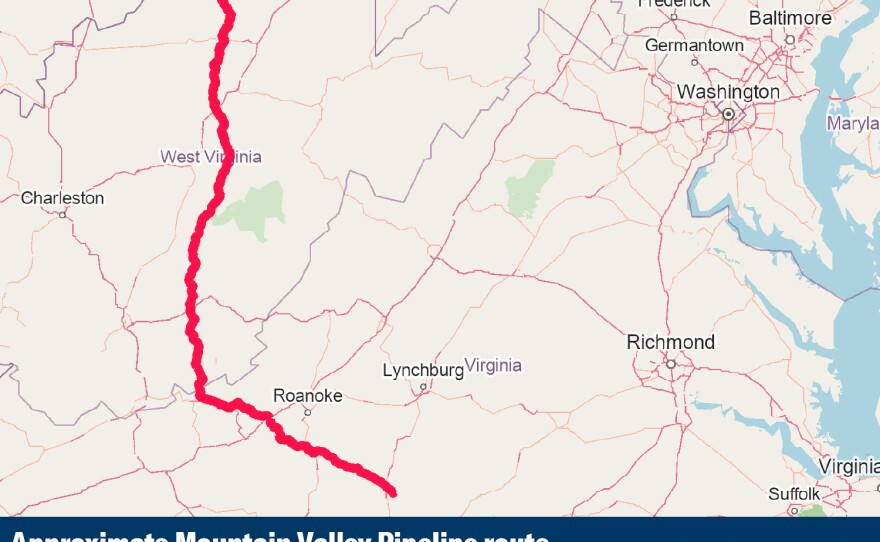Economic legislation agreed to by Sens. Chuck Schumer (D-NY) and Joe Manchin (D-WV) last week could reduce national carbon emissions by 40% in about 8 years.
The proposal — which Democrats are calling the Inflation Reduction Act — includes about $370 billion in climate spending. But a one-page summary of permitting provisions included in the agreement made by Manchin and Schumer, and posted by Politico, show that the West Virginia senator was able to secure a commitment from Democratic leaders to complete construction of the long-postponed Mountain Valley Pipeline.
The proposed 303-mile natural gas pipeline, which runs through West Virginia and into southwest Virginia, was originally slated for completion in 2018, but years of legal challenges in the U.S. 4th Circuit Court of Appeals have stripped essential permits and halted progress.
The one-page permitting summary describes a plan that would require agencies to approve remaining permits and change how suits over energy projects are handled — including giving jurisdiction on MVP litigation to the U.S. Court of Appeals for the District of Columbia Circuit.
Grace Tuttle — of the Protect Our Water, Heritage, Rights Coalition, which works with grassroots environmental groups across Appalachia — was in Washington protesting on Tuesday with other advocacy groups outside the White House. Those gathered in the capital were calling for President Joe Biden to declare a climate emergency and halt new fossil fuel projects, like the MVP, nationwide.
“We’re also here to tell him that people in Appalachia, people on the frontlines of the MVP fight will not be sacrificed for this political deal,” Tuttle told VPM News over the phone.
She said that as an Appalachian climate activist, she’s “between a rock and a hard place.”
Some have called the spending proposal the country’s most aggressive move toward carbon neutrality — which United Nations leaders and climatologists worldwide have said is needed by 2050 in order to avoid the worst impacts of climate change, like increases in the frequency and intensity of flooding and drought.
The Inflation Reduction Act does include what Tuttle called “desperately needed” provisions — like a program to aid miners suffering from black lung disease and funding that could help people, like Virginians and Kentuckians, dealing with worsening floods in their communities.
"When people say that finishing MVP is a small price to pay for advancing climate legislation, that just reinforces the myth that these projects are inevitable, and it’s just gonna condemn us to more devastation ... across the country,” Tuttle said.
Mountain Valley LLC, the organization set to build the pipeline, recently asked the Federal Energy Regulatory Commission to grant it an additional four years to obtain a handful of permits and complete the project.
Gov. Glenn Youngkin weighed in on the MVP last week, expressing his desire for it to be completed. He said that natural gas remains an essential part of Virginia’s transition to clean energy.
Bringing natural gas plants online while retiring coal plants has kept Virginia’s emissions steady while electricity consumption has increased during the past decade — though a breakdown of electricity production for the state shows that almost all of the Old Dominion’s coal-fired energy has already been replaced.
The Atlantic Coast Pipeline, a planned pipeline backed by Dominion Energy that would have crossed West Virginia, Virginia and North Carolina, was canceled in July 2020. It faced widespread grassroots opposition and extensive delays.
Youngkin, though, is seeking permitting reform of his own in Virginia. He recently appointed Andrew Wheeler, a former EPA head and fossil fuel lobbyist, to head the newly created Office of Regulatory Management. The office will review Virginia’s regulatory code and has been directed to implement a 25% reduction in regulatory requirements.



